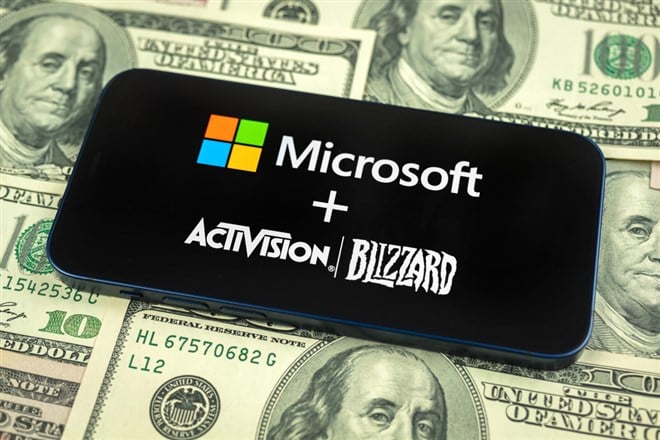Microsoft-Activision Blizzard Merger: Navigating Risk and Reward
The latest on the Microsoft-Activision Blizzard merger, the potential for regulators to disrupt the deal, and the odds of the deal closing.
This story originally appeared on MarketBeat

Microsoft (NASDAQ: MSFT) proposed $66.7 billion acquisition of Activision-Blizzard (NASDAQ: ATVI) which has put regulators on high alert. The deal, which would make Microsoft the world’s third-largest gaming company, raised concerns about the concentration of power in big tech and sparked investigations by the FTC, UK CMA, and the European Commission.
Activision found itself in a pickle in 2021, becoming the subject of several investigations for wrongful termination, sexual harassment, and employment discrimination, among other things. The rank-and-file and leadership lost faith in CEO Bobby Kotick, and the company needed a fresh start.
Microsoft smelt blood in the water and sensed an opportunity to acquire a gem of gaming assets during a period of distress.
Antitrust Concerns
Microsoft and Activision-Blizzard are facing a three-front war with western regulators over antitrust concerns. Regulators are worried that more concentration of power put in the hands of the owner of Xbox would stifle competition in the gaming industry.
And as such, the FTC is suing to block the deal, while the UK CMA and European Commission are investigating the deal for antitrust concerns.
The key issue is the dominance of the Call of Duty franchise and regulators’ worries about the game becoming an Xbox exclusive or Microsoft degrading the Call of Duty experience for PlayStation and Nintendo gamers.
The UK antitrust regulator even suggested Wednesday that Microsoft divest of the Call of Duty franchise entirely on Wednesday. While Microsoft is motivated to close the deal, they might lose their drive if divesting Call of Duty, Activision’s crown jewel, becomes a sticking point for regulators.
However, Microsoft claims they don’t plan to make Call of Duty an Xbox exclusive, offering written guarantees to Sony and Nintendo that Call of Duty would be available on their consoles.
Even so, regulators continue to pound the table that owning Call of Duty would give Microsoft too much power in the industry.
Consequently, Wall Street is betting that Microsoft will have to make meaningful concessions to regulators if the deal is to even go through, especially given the aggressive anti-monopoly stances taken by the Biden administration’s regulators.
The spread between the deal price and Activision’s current price is very wide. Activision stock is trading at a steep 26% discount to the $95 deal price, which is highly unusual for a friendly deal buoyed by a blue chip buyer in Microsoft. But, western governments are making their objections to concentrations of power in big tech known.
Making the Right Trade: The One Question to Ask
Many legendary traders say you should be able to explain any good trade/investment to a 6th grader. You can bury yourself in SEC filings all day. Still, the final decision to make the trade should hinge on straightforward criteria.
First, how do we get from where we are to the deal closing? Assuming reporting on the deal is correct, the only hump is regulator intervention. So Microsoft must strike separate agreements with the US, UK, and EU.
This brings us to the ultimate question traders should ask themselves: Does the deal have a higher or lower probability of closing than the market-implied probability of 30%?
Simplifying the decision brings the most important aspects of analyzing the deal to the forefront.
Primarily, do regulators’ complaints have merit and are they likely to succeed in court? We can look at factors like the success rate of recent antitrust cases and analyze the merits of the legal claims against legal precedent.
These are simple questions, but they require deep analysis to answer accurately.
Bottom Line
The Microsoft-Activision Blizzard merger has shaken up the gaming industry since its announcement. Completing the deal would solidify Microsoft’s position as a gaming powerhouse, raising concerns among gamers and regulators. The potential for Xbox to become the exclusive platform for blue-chip gaming franchises like Call of Duty and Overwatch is significant.
Completion of the deal hinges on if regulators can successfully block the deal. Traders should carefully consider the recent success rate of antitrust regulators blocking deals while also analyzing the merits of the legal claims by regulators before making a decision.
Despite the complexities of mergers and acquisitions, the ultimate factor for traders to consider is whether they would lay or take the odds the market is offering.

Microsoft (NASDAQ: MSFT) proposed $66.7 billion acquisition of Activision-Blizzard (NASDAQ: ATVI) which has put regulators on high alert. The deal, which would make Microsoft the world’s third-largest gaming company, raised concerns about the concentration of power in big tech and sparked investigations by the FTC, UK CMA, and the European Commission.
Activision found itself in a pickle in 2021, becoming the subject of several investigations for wrongful termination, sexual harassment, and employment discrimination, among other things. The rank-and-file and leadership lost faith in CEO Bobby Kotick, and the company needed a fresh start.





